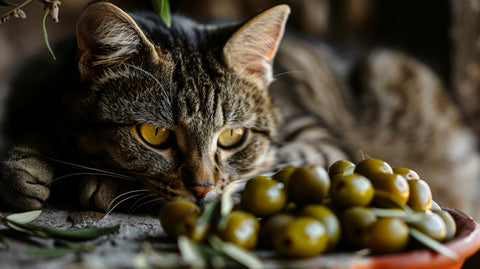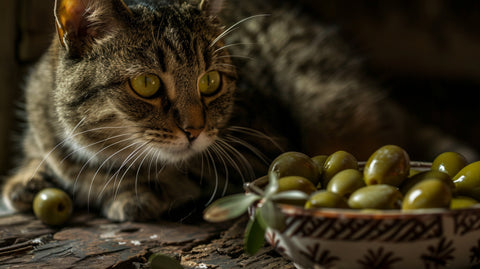Introduction
Cats are curious creatures with unique dietary needs. As responsible pet owners, it's essential to understand what foods are safe for our feline friends and what items should be kept away from their reach. One such food that often raises questions is olives. In this article, we'll delve into whether cats can eat olives and explore the potential risks and benefits associated with this popular snack.
Nutritional Value of Olives
Olives are a staple in many cuisines around the world, prized for their rich flavour and versatility. These small fruits are packed with nutrients such as healthy fats, vitamins, and minerals. For humans, olives offer numerous health benefits, including cardiovascular support and antioxidant properties.
Can Cats Eat Olives?
While olives are not inherently toxic to cats, they are not an ideal food choice for our feline companions. Cats have specific dietary requirements that differ from humans, and their digestive systems may not tolerate certain foods well. Therefore, it's essential to exercise caution when offering olives to cats.

Potential Risks of Feeding Olives to Cats
Feeding olives to cats can pose several risks to their health. Firstly, olives are high in sodium, which can lead to electrolyte imbalances and dehydration in cats. Additionally, the pits found in some olives can present a choking hazard or cause intestinal blockages if ingested. Furthermore, the high-fat content of olives may contribute to digestive issues such as vomiting or diarrhoea in cats.
Alternatives to Olives for Cat Treats
Instead of offering olives to your cat, consider providing them with safer and more suitable treats. There are plenty of cat-friendly snacks available, both commercially and homemade, that can satisfy your cat's cravings without compromising their health. Options such as cooked chicken, fish, or freeze-dried meat treats are often well-received by cats and offer nutritional benefits.
How to Introduce New Foods to Cats
When introducing new foods to your cat's diet, it's essential to proceed with caution. Cats can be sensitive to dietary changes, so it's best to introduce new foods gradually. Start by offering small amounts of the new food alongside their regular meals and monitor their response. Look for signs of allergies or intolerances, such as itching, vomiting, or diarrhoea, and discontinue feeding the new food if any adverse reactions occur.
Signs of Olive Toxicity in Cats
While olives themselves are not toxic to cats, certain ingredients commonly found in olives, such as garlic or onions, can be harmful to felines. If your cat ingests olives containing these ingredients, watch for signs of toxicity, including lethargy, weakness, vomiting, or diarrhoea. If you suspect that your cat has ingested a toxic substance, contact your veterinarian immediately for advice.
Conclusion
In conclusion, while olives may seem like a harmless snack, they are not suitable for cats. The high sodium content, potential choking hazards, and risk of digestive upset make olives an unsuitable choice for feline consumption. Instead, opt for cat-friendly treats that meet their nutritional needs and minimise the risk of adverse reactions. As always, consult with your veterinarian if you have any concerns about your cat's diet or health.
FAQs
1. Can olives be toxic to cats?
Olives themselves are not toxic to cats, but certain ingredients commonly found in olives, such as garlic or onions, can be harmful to felines.
2. Are there any safe alternatives to olives for cats?
Yes, there are plenty of safe and healthy alternatives to olives for cats, including cooked chicken, fish, or freeze-dried meat treats.
3. How should I introduce new foods to my cat?
When introducing new foods to your cat's diet, it's best to do so gradually, starting with small amounts alongside their regular meals.
4. What should I do if my cat ingests olives?
If your cat ingests olives and shows signs of distress or illness, contact your veterinarian immediately for advice and assistance.
5. Are there any signs of olive toxicity I should watch for in my cat?
Watch for signs such as lethargy, weakness, vomiting, or diarrhoea, which may indicate olive toxicity in cats.

Unlock a World of Pet Wellness with Cooper & Gracie
At Cooper & Gracie, we're dedicated to enhancing the lives of pets and their owners through premium-quality cat products and unwavering commitment to pet wellness. With our extensive range of grooming essentials, and natural supplements, we provide everything your furry friend needs to thrive. From luxurious shampoos and conditioners to soothing balms and nutritional supplements, each product is meticulously crafted to deliver exceptional results and promote the health and happiness of your beloved pet.
Join the Cooper & Gracie family today and experience the difference for yourself. Whether you're looking to pamper your pet with our indulgent grooming range or support their wellbeing with our natural supplements, we've got you covered. Shop now and embark on a journey towards a happier, healthier life with your furry companion. Your pet deserves the best, and at Cooper & Gracie, we're here to deliver just that.
Unlock a world of pet wellness with Cooper & Gracie. Shop now and give your pet the love and care they deserve.

